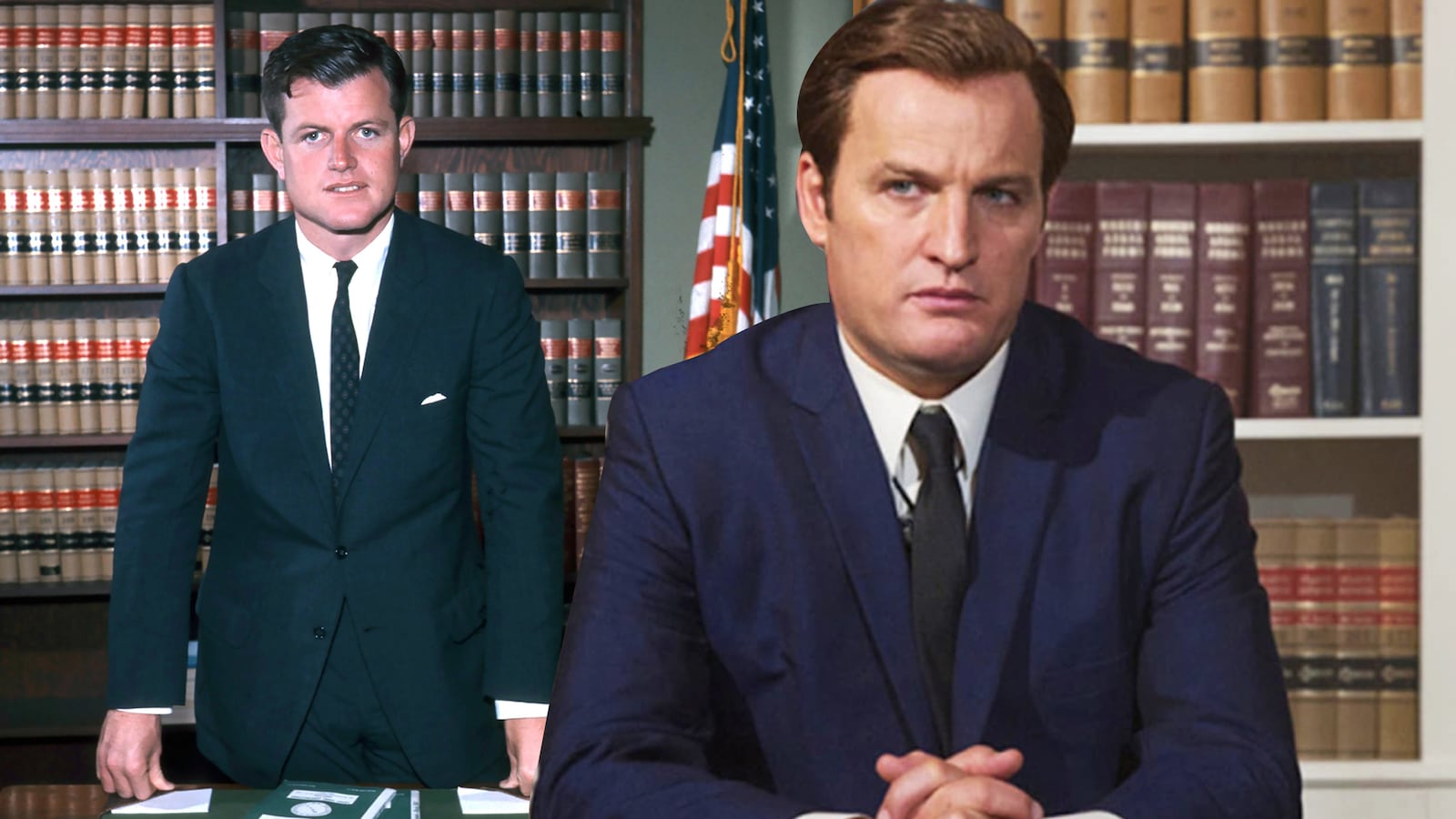It’s been nearly 50 years since Ted Kennedy drove his car off a bridge in the tiny New England island of Chappaquiddick, in the process killing his female companion Mary Jo Kopechne, and yet a number of pressing questions remain. Was Kennedy drunk when he got behind the wheel? Was he having an affair with Mary Jo, one of the “Boiler Room Girls” who’d previously worked on his brother Bobby’s presidential campaign? How did Kennedy escape the submerged vehicle, and did he know at the time that Mary Jo might still be alive in the car, courtesy of a pocket of oxygen? Why did he wait 10 hours before reporting the accident to authorities, and then recount stories littered with contradictions and inaccuracies? And, moreover, did he ever truly feel regret over his actions?
Chappaquiddick, John Curran’s new film about the scandal, has few definitive answers.
On the one hand, that failure to satisfactorily solve the mystery of that fateful summer night renders Curran’s latest something of an invariable disappointment. Stitching together facts and speculation to provide something like a basic timeline of the disaster, the drama—which first premiered at last year’s Toronto International Film Festival, and arrives in theaters April 6—often feels like a hollow bit of conjecture. Unsure of precisely what caused Kennedy to lose control of his car and subsequently act in the bizarre ways that he did, it proceeds forward in the same sort of haze that engulfs its protagonist in the hours and days immediately following the crash.
Devoid of revelations, the film instead focuses on the creation and delivery of the narrative that Kennedy used to survive this calamity—if not with plausible presidential hopes (which, it argues, he may have never had in the first place), then at least with a career and reputation intact. That, however, has an unexpected upside: It allows Chappaquiddick to become an example of the very thing it portrays.
Taylor Allen and Andrew Logan’s script opens with Kennedy (Jason Clarke) conducting a TV interview in which he addresses the long shadow cast by his deceased brothers Jack and Bobby. As we soon learn, it’s not just those assassinated siblings to whom Kennedy feels he can’t measure up; it’s also his father, Joseph P. Kennedy Sr. (Bruce Dern), who, despite being in a wheelchair courtesy of a debilitating stroke, remains the domineering specter hovering over the Massachusetts senator’s life.
As embodied by Clarke with an outward composure that seems to be cracking at its edges, Kennedy is a famous man with a crushing inferiority complex. And on the evening in question, no amount of revelry at his remote Chappaquiddick retreat, nor his trying-too-hard claims that everyone in attendance is part of his “family,” can appease it, or drown out the constant drumbeat for his inevitable run at the Oval Office.
Curran stages the ensuing tragedy with excessive ominousness, his every close-up of vital clues, and aerial shot of Kennedy’s car wending its away along secluded roads, gracelessly underlining the horror waiting just around the corner. Unfortunately, because he has no idea what precisely took place, the director’s depiction of Kennedy as sober—and not romantically linked to Mary Jo (Kate Mara, in a thankless role)—seems no more conclusive than his murky depiction of what led Kennedy’s sedan to nosedive into the water. Once it does, Kennedy enlists the aid of his cousin Joey Gargan (a charismatic Ed Helms) and former U.S. Attorney for Massachusetts Paul Markham (Jim Gaffigan) to help him try to recover Mary Jo, and then to follow him around as he doggedly avoids notifying anyone about what’s transpired. Their unproductive nocturnal activities verify that Kennedy dropped the ball in every conceivable way during these crucial early moments. But as for his reasons for doing so? Your guess is as good as the film’s.
Yet that very ignorance is part and parcel of what Chappaquiddick is after, as evidenced by the ensuing passages that detail Kennedy’s damage-control operation executed by a legal team that includes Robert McNamara (Clancy Brown) and Ted Sorenson (Taylor Nichols). Treating Kennedy as a knucklehead, which he often seems to be, their efforts to shake him from his guilt-ridden stupor and protect him from self-destruction are a success, largely because of their ability (via make-believe excuses for his baffling behavior) to prey upon his insecurities. As Curran makes clear, those were many, most of them having to do with a father convinced that his youngest progeny would amount to nothing—in a one-note villainous role, Dern croaks “Alibi” as advice, then insults and slaps his son with casual cruelty—and dead brothers whom even Kennedy’s own kids thought “could do no wrong.” In the face of that, Kennedy views his own survival as a necessary refutation of his little-man status—if not proof that he’s following in his illustrious ancestors’ footsteps by overcoming unthinkable misfortune for the good of himself, his clan, and his country.
Kennedy’s gradual transformation from a self-doubting politician uninterested in living up to (personal, familial, national) expectations, to a self-made martyr driven by arrogant self-preservation instincts, is ably realized by the dead-eyed vacant—then fiercely determined—Clarke. Initially brought low by the Chappaquiddick incident, his Kennedy realizes that the key to validating his own sense of self-worth lies in seizing the power and stature that is his birthright. To save himself, to prove abusive old dad wrong, and to finally step out of Jack and Bobby’s shadow, Chappaquiddick’s Kennedy embraces a self-serving version of events that salvages his future fortunes—as underlined by the coda that reminds viewers that he enjoyed the fourth-longest senatorial tenure ever.
What he does, ultimately, is triumph by wielding his tremendous political power to (re)write history. And thus Chappaquiddick, incapable of uncovering the truth about what really took place on July 19, 1969, confirms that such power exists—and that the narratives fashioned by those who possess it endure long after everyone involved in such tall tales are gone.






